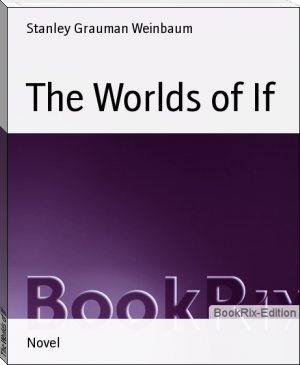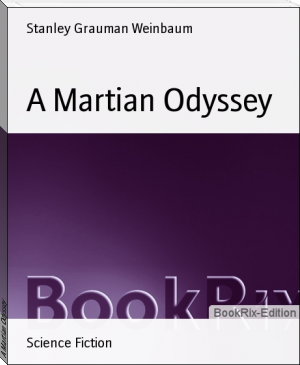author - "Stanley Grauman Weinbaum"

"Places where many people live close together."
"Oh," said the girl frowning. "No. There are no cities here."
"Then where are the people of Paracosma? You must have neighbors."
The girl looked puzzled. "A man and a woman live off there," she said, gesturing toward a distant blue range of hills dim on the horizon. "Far away over there. I went there once, but Leucon and I prefer the valley."
"But Galatea!" protested Dan. "Are you and Leucon alone in this valley? Where--what happened to your parents--your father and mother?"
"They went away. That way--toward the sunrise. They'll return some day."
"And if they don't?"
"Why, foolish one! What could hinder them?"
"Wild beasts," said Dan. "Poisonous insects, disease, flood, storm, lawless people, death!"
"I never heard those words," said Galatea. "There are no such things here." She sniffed contemptuously. "Lawless people!"
"Not--death?"
"What is death?"
"It's--" Dan pause

'Do you suppose,' I asked suddenly, 'that anyone exists twice on the same earth? Reincarnation in the sense of the Hindus?'
He laughed scornfully. 'The age of the earth is somewhere between a thousand million and three thousand million years. What proportion of eternity is that?'
'Why--no proportion at all. Zero.'
'Exactly. And zero represents the chance of the same atoms combining to form the same person twice in one cycle of a planet. But I have shown that trillions, or trillions of trillions of years ago, there must have been another earth, another Jack Anders, and'--his voice took on that whining note--'another crash that ruined Jack Anders and old de Neant. That is the time you must remember out of lethargy.'
'Catalepsy!' I said. 'What would one remember in that?'
'God knows.'
'What a mad scheme!' I said suddenly. 'What a crazy pair of fools we are!' The adjectives were a mistake.
'Mad? Crazy?' His voice became a screech. 'Old de Neant is mad, eh?

at the earth on my diagram, and then at myself, and then, to clinch it, I pointed to myself and then to the earth itself shining bright green almost at the zenith.
"Tweel set up such an excited clacking that I was certain he understood. He jumped up and down, and suddenly he pointed at himself and then at the sky, and then at himself and at the sky again. He pointed at his middle and then at Arcturus, at his head and then at Spica, at his feet and then at half a dozen stars, while I just gaped at him. Then, all of a sudden, he gave a tremendous leap. Man, what a hop! He shot straight up into the starlight, seventy-five feet if an inch! I saw him silhouetted against the sky, saw him turn and come down at me head first, and land smack on his beak like a javelin! There he stuck square in the center of my sun-circle in the sand--a bull's eye!"
"Nuts!" observed the captain. "Plain nuts!"
"That's what I thought, too! I just stared at him open-mouthed while he pulled his head out of the sand an

He is best known for the groundbreaking science fiction short story, "A Martian Odyssey", which presented a sympathetic but decidedly non-human alien, Tweel. Even more remarkably, this was his first science fiction story (in 1933 he had sold a romantic novel, The Lady Dances, to King Features Syndicate, which serialized the story in its newspapers in early 1934).

"Places where many people live close together."
"Oh," said the girl frowning. "No. There are no cities here."
"Then where are the people of Paracosma? You must have neighbors."
The girl looked puzzled. "A man and a woman live off there," she said, gesturing toward a distant blue range of hills dim on the horizon. "Far away over there. I went there once, but Leucon and I prefer the valley."
"But Galatea!" protested Dan. "Are you and Leucon alone in this valley? Where--what happened to your parents--your father and mother?"
"They went away. That way--toward the sunrise. They'll return some day."
"And if they don't?"
"Why, foolish one! What could hinder them?"
"Wild beasts," said Dan. "Poisonous insects, disease, flood, storm, lawless people, death!"
"I never heard those words," said Galatea. "There are no such things here." She sniffed contemptuously. "Lawless people!"
"Not--death?"
"What is death?"
"It's--" Dan pause

'Do you suppose,' I asked suddenly, 'that anyone exists twice on the same earth? Reincarnation in the sense of the Hindus?'
He laughed scornfully. 'The age of the earth is somewhere between a thousand million and three thousand million years. What proportion of eternity is that?'
'Why--no proportion at all. Zero.'
'Exactly. And zero represents the chance of the same atoms combining to form the same person twice in one cycle of a planet. But I have shown that trillions, or trillions of trillions of years ago, there must have been another earth, another Jack Anders, and'--his voice took on that whining note--'another crash that ruined Jack Anders and old de Neant. That is the time you must remember out of lethargy.'
'Catalepsy!' I said. 'What would one remember in that?'
'God knows.'
'What a mad scheme!' I said suddenly. 'What a crazy pair of fools we are!' The adjectives were a mistake.
'Mad? Crazy?' His voice became a screech. 'Old de Neant is mad, eh?

at the earth on my diagram, and then at myself, and then, to clinch it, I pointed to myself and then to the earth itself shining bright green almost at the zenith.
"Tweel set up such an excited clacking that I was certain he understood. He jumped up and down, and suddenly he pointed at himself and then at the sky, and then at himself and at the sky again. He pointed at his middle and then at Arcturus, at his head and then at Spica, at his feet and then at half a dozen stars, while I just gaped at him. Then, all of a sudden, he gave a tremendous leap. Man, what a hop! He shot straight up into the starlight, seventy-five feet if an inch! I saw him silhouetted against the sky, saw him turn and come down at me head first, and land smack on his beak like a javelin! There he stuck square in the center of my sun-circle in the sand--a bull's eye!"
"Nuts!" observed the captain. "Plain nuts!"
"That's what I thought, too! I just stared at him open-mouthed while he pulled his head out of the sand an

He is best known for the groundbreaking science fiction short story, "A Martian Odyssey", which presented a sympathetic but decidedly non-human alien, Tweel. Even more remarkably, this was his first science fiction story (in 1933 he had sold a romantic novel, The Lady Dances, to King Features Syndicate, which serialized the story in its newspapers in early 1934).


